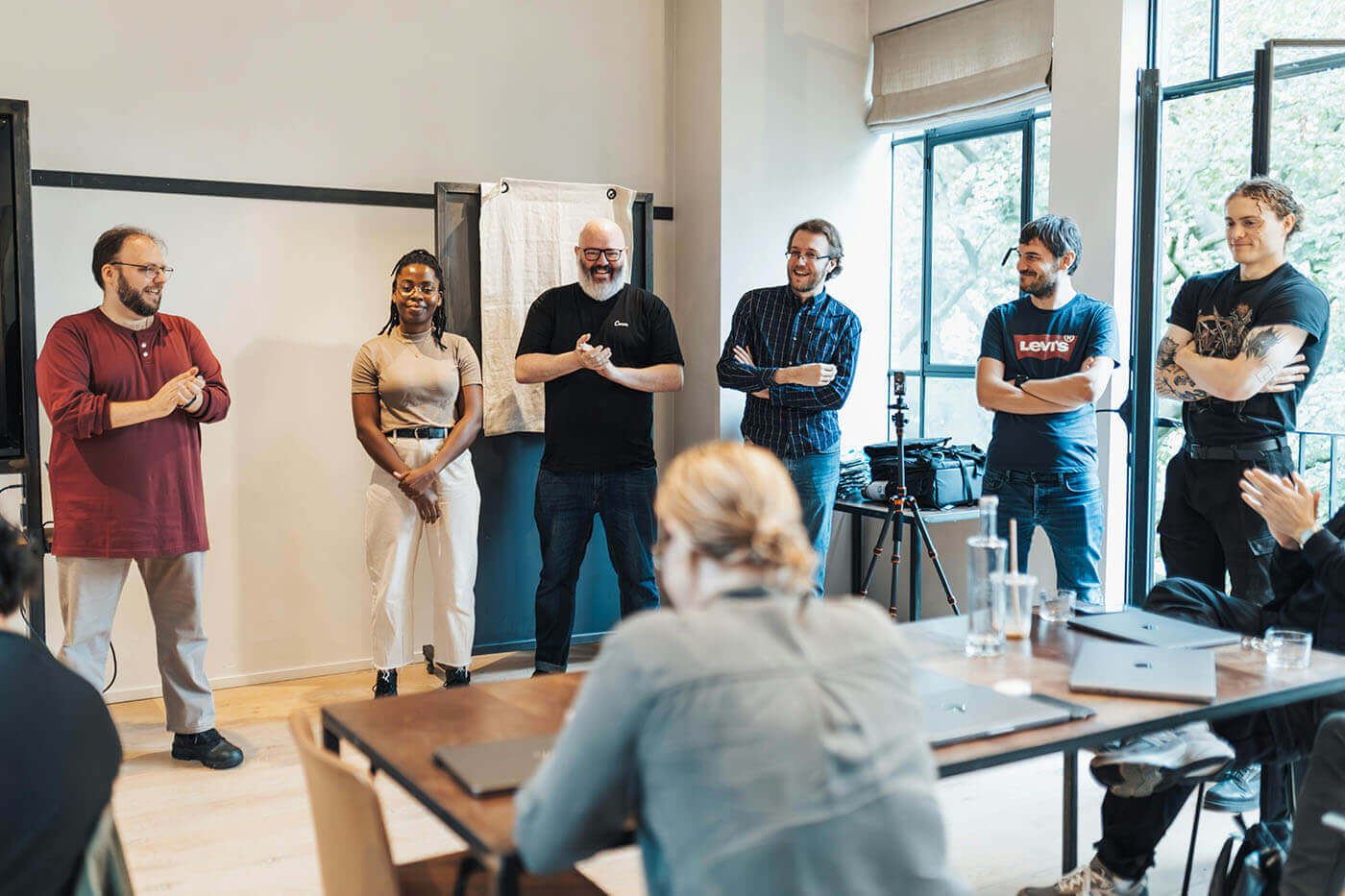Blog
Human Sustainability: The New Way to Approach Employee Wellbeing

It’s no longer enough for organizations to focus solely on maximizing profits and stock returns. In a knowledge-powered economy, companies are realizing the importance of investing in employee well-being. As technology is changing fast and there’s more and more AI in HR, companies need to focus on human sustainability in order to achieve long-term success.
What is human sustainability?
Human sustainability, as defined in a 2024 Deloitte report, is “the degree to which the organization creates value for people as human beings.” In essence, it’s about leaving individuals better off than when they joined—whether through improved health, career growth, equity, belonging or a deeper sense of purpose. It’s a commitment to enhancing societal well-being, empowering future generations and focusing on human outcomes, all with the understanding that prioritizing people ultimately drives long-term business success.
The Deloitte report argues that human sustainability is necessary to advance the social element of ESG (which stands for environmental, social and government). That’s because without a clear definition, many companies end up looking at it from a short-term—and often transactional—perspective. For example, many companies look at employee engagement, retention and turnover rates when they want to get a read of employee satisfaction levels.
But these metrics—while helpful and valuable—don’t always tell the whole story. Human sustainability often provides a better picture, because they measure human outcomes as part of organizational performance.
Human sustainability is a mindset that treats employees as human beings
According to research conducted by global risk-management services AON, companies that prioritize and improve factors relating to employee wellbeing can expect improved performance by at least 11 percent, and up to 55 percent. But while many executives want their organization to improve human sustainability, there’s a disconnect between their perspective and the perspective of their employees. The Deloitte report found that 89% of executives believe that their organizations are “advancing human sustainability in some capacity,” while the figures for employees sit at just 41%.
Part of that disconnect might be due to corporate leaders’ mindset, which is very much rooted in transactional thinking. Corporations have incentives to get the most out of their employees and often view well-being as a way to maximize output to achieve stronger profits. This is especially prevalent in how companies typically measure productivity. According to Slack’s The State Of Work in 2023 report, most companies still define productivity as generating high inputs (i.e. amount of time spent at work, code written), rather than outcomes. However, this kind of mindset isn’t conducive to improving human sustainability.
What is conducive to human sustainability is focusing on value creation and outcomes, rather than inputs and performative work. But it’s also about acknowledging that employees are human beings who are worth more than the output they produce for the company. A human sustainability mindset means considering (and not dismissing) employees’ perspectives on flexible work, diversity and inclusion, health benefits and parental leave. It’s adopting practices related to taking care of employee well-being and understanding the strong business case for doing so.
The role of HR in human sustainability initiatives
Human Resources should play a crucial role in designing and implementing human sustainability initiatives. As Sue Cantrell, Deloitte’s VP of Products for Workforce Strategies told Worklife, human sustainability requires organizations to fix ‘structural issues that block progress.’ That requires organizations to do a deep dive into issues that—from their employees’ perspective—are holding them back. Once organizations have identified those issues, they need to plan policies and structural changes to improve the situation. Also, HR should be involved in designing and implementing those policies, including determining the metrics that organizations will use to measure success.
There isn’t a common set of metrics for human sustainability. Deloitte and AON for example, have their own. Regulatory requirements such as the US human capital disclosure rule and the European Union’s sustainability reporting standards are also helpful references. Broadly, human sustainability relates to the following concepts.
Purpose
Purpose is a key part of human sustainability. Numerous research has consistently found the benefits between purpose and greater health outcomes. In a 2019 study of 6,895 Americans, having a life purpose is “significantly associated with all-cause mortality,” meaning that those with purpose are more likely to live longer. On the other hand, a 2024 study that tracked 910 older adults for 14 years found that those lacking purpose in life had very few opportunities for personal growth and may be more likely to develop mild cognitive impairment (MCI), which is a precursor to dementia.
In the context of organizations, purpose-driven employees or those who feel that their work provides opportunities for personal growth are likely to be healthier and happier. And workers who are happy at work are more productive and create greater value than their unhappier counterparts, according to a 2019 research.
Of course, it’s important to note that every individual derives purpose from different things, so there isn’t going to be a uniform policy or change that will please every single employee. What companies can do, however, is invest resources in initiatives that provide employees the opportunity to discover their purpose at work.
That might mean providing a ‘learning’ stipend for employees to learn skills outside of their job, or ensuring—as much as possible—that managers lean into their team’s strengths and interests when delegating projects. Alternatively, it might also mean acknowledging that for some employees, their purpose lies outside of work. And to perform their best at work, they need to have the space and time for those pursuits without feeling like it threatens their career stability.
Belonging
Belonging is another important aspect of human sustainability. That’s because a sense of belonging plays a major factor in an individual’s satisfaction at work and their wellbeing. People thrive (and are more motivated and engaged) when they feel a sense of belonging in the workplace. According to 2019 research on belonging by global professional services firm Ernst and Young, a sense of belonging “significantly reduces stress level and improves physical health, emotional well-being, and performance.”
The report found some key findings that contributed to belonging. First, it goes hand in hand with diversity and inclusion practices. Employees need to feel like they can be fully themselves at work without needing to hide any part of their identity. Those who belong to under-represented groups might have to exert additional energy in order to fit in at work, and the onus is on organizations to create an environment where they don’t feel the need to code-switch constantly.
Regular check-ins from managers and colleagues can go a long way in preventing workers from checking out. According to the report, it is more important than receiving feedback, public recognition, being invited to out-of-office events and being included in emails and meetings with senior leaders. 39% of respondents said that they feel the greatest sense of belonging at work when colleagues check in on them (personally and professionally). What this tells organizations is that they need to encourage a culture of open conversations. Some things that they can do to do this include implementing a mentoring program, investing in employee communities and creating opportunities for employees to socialize both in formal and informal settings.
Fulfillment
When it comes to measures of employee satisfaction, many organizations turn to employee engagement. But while this is a useful metric, it doesn’t always tell the whole picture. An employee can be highly engaged in their work, for example, but be on a path to burnout, which can cause disengagement later on.
Employee recognition software firm O.C. Tanner made the argument that employee fulfillment is a much better measurement of satisfaction and human sustainability. According to the firm’s 2023 research report, employee fulfillment has “the most decisive impact on an employee’s choice to stay in their job, do great work, and define their organization as a great place to work.”
Employees who lack fulfillment, on the other hand, can bring negative consequences to the company. The report found that unfulfilled employees are 399% more likely to actively look for a job outside of the organization, and 340% more likely to leave their job in one year or less.
Improving employee fulfillment requires a multi-faceted approach. The study found that the four factors that greatly improve fulfillment include balance, community, connection and belonging, growth, and purpose. Improving all three will require organizations to tackle this from multiple angles. This might involve flexible work policies, introducing leadership development initiatives, providing learning opportunities, implementing mentorship programs, or facilitating events that encourage sponsor and mentor relationships to form.
Impact
Impact is also vital to human sustainability because it often gives employees a sense of fulfillment and purpose. In a large organization, it can be difficult to identify how their day-to-day tasks contribute to the goals of the company. Depending on the specific goods and services that the company provides, certain departments or teams’ impacts may be more visible and obvious than others.
It’s the company’s responsibility to make every employee understand the impact that their work has on the company. That might mean incorporating public recognition when possible, or having a culture of celebration when a team or individual does something impactful. Providing opportunities for employees to be mentors also creates opportunities for impact. Being a mentor—whether that be in a traditional one-on-one setting or reverse mentorship—provides an opportunity to have a positive impact in somebody else’s life.
Development
The opportunity to advance, learn and grow is also crucial to improving human sustainability in the workplace. The O.C. Tanner’s report listed lack of challenge of growth as one of the main reasons why employees are unfulfilled at work. Employees who feel a low sense of growth and development are 212% more likely to experience burnout. Employees who feel like their work provides a high sense of growth and development, on the other hand, are 289% more likely to take pride in the organization and 121% to be a promoters of the organization.
While many employees view development as pay increases and promotion, there are many other ways that organizations can encourage growth. For starters, they can invest in (or implement) a skills development program. They can create internal learning opportunities, or subsidize courses and programs. Mentoring can also go a long way in improving human sustainability. Any mentoring relationship will involve an exchange of ideas, and can also expose employees to advancement opportunities in another part of the organization that they might not otherwise have been exposed to.
Advancing human sustainability in your organization
Organizations that prioritize human sustainability can expect stronger firm performance in the long run. How your employee experiences the workplace will have a positive or negative impact on your bottom line.
Making progress on human sustainability issues, however, will not happen overnight. It requires organizations to create an inclusive, supportive, and thriving culture, and ensure that their employees are compensated fairly while working in an environment that allows them to be at their best.
There are two particular human sustainability initiatives that can make a big difference to an organization. The first is a formal mentorship program. Mentoring creates a strong positive relationship and provides opportunities for people. One global tech company that implemented a mentoring program in partnership with Chronus saw numerous benefits in just two years—they saw greater collaboration amongst their different brands, and saw a 71% retention rate amongst mentoring participants, compared to 59% of non-participants.
Employee communities is another initiative that can improve human sustainability through providing a sense of belonging. It provides a safe space for employees to work through similar issues together, and learn and grow with each other. This is also a powerful way to hold leaders accountable when it comes to advancing DEI goals.
Chronus allows your organization to automate the work that comes with running a mentorship program and managing connection communities. Both the Mentoring Software and Connection Communities allow your organization to configure, launch and build a mentoring or community program that is specific to your needs and that you can scale as your company grows.
Investing in the mentoring and community management software will also provide access to data that allows you to progress in real-time—whether that be attendance, membership, or participation levels. This way, you can tweak the programs to provide the maximum impact for your human sustainability goals.
Bottom line: Focusing on human sustainability leads to better business outcomes.
Share this post:
|
Get our resources straight to your inbox. Subscribe today!
Follow Chronus for the Latest Updates

Anisa Purbasari
Anisa Purbasari is a freelance journalist, content creator, editor, and writer. She writes and edits stories about all things related to the intersection of work and life—whether that’s productivity, personal finance, careers, leadership, psychology, or workplace culture. Her work has been published in a range of publications including Fast Company, Business Insider, and BBC.



